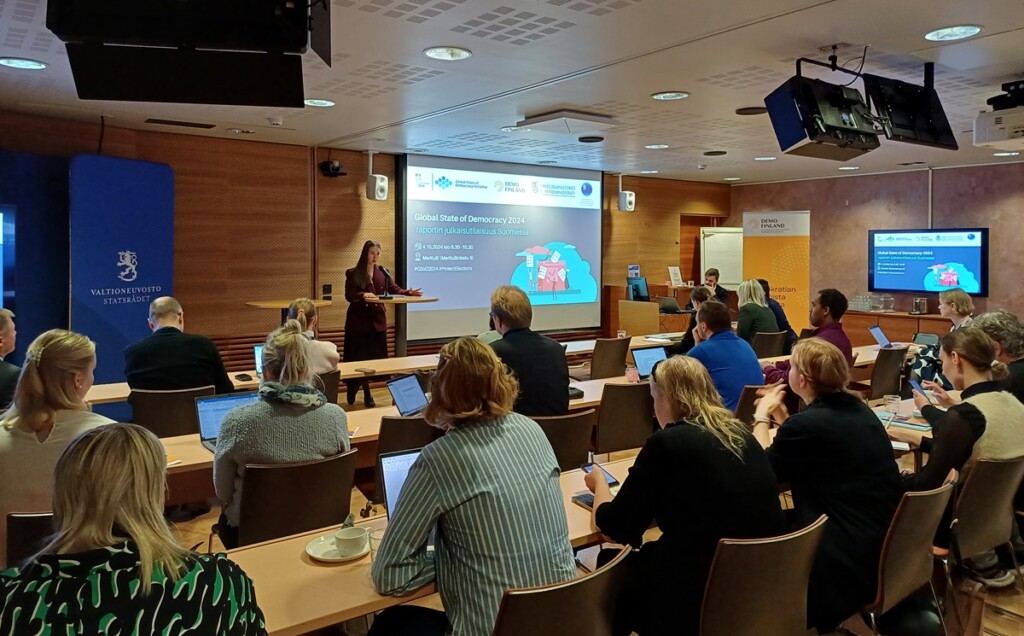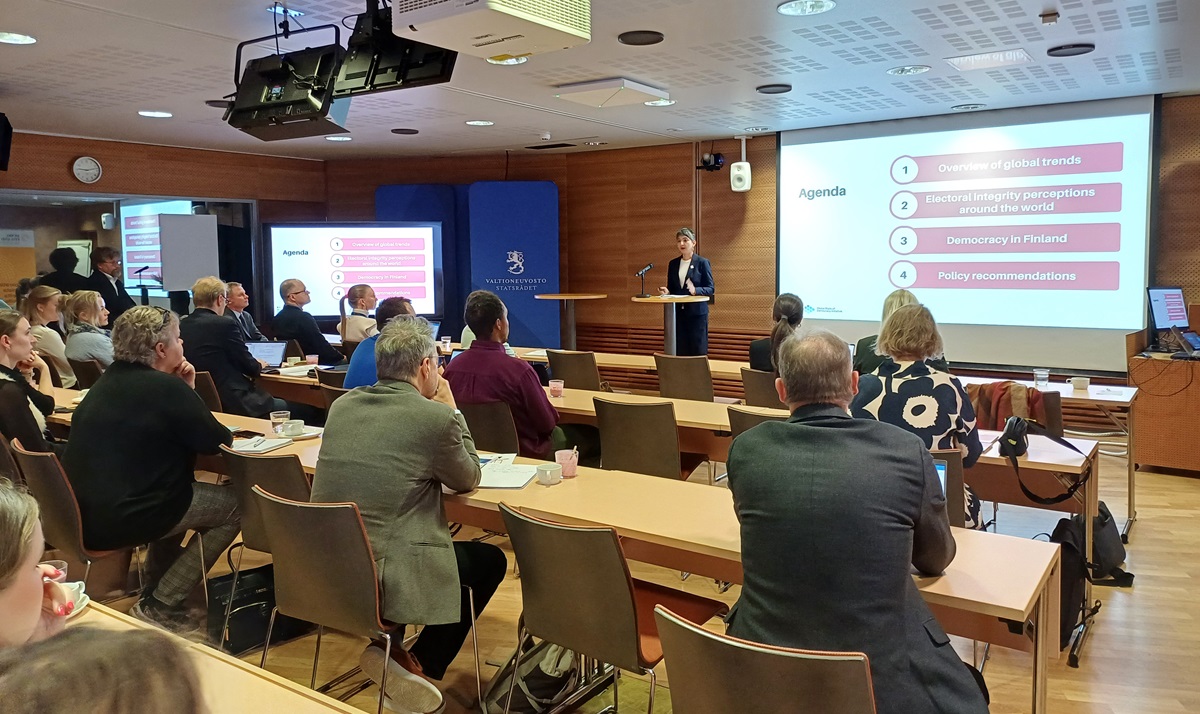Demo Finland, the Ministry for Foreign Affairs and the Ministry of Justice, in co-operation with the International IDEA, organised the Finnish launch event of the Global State of Democracy report, published in September. The Global State of Democracy 2024: Strengthening the Legitimacy of Elections in a Time of Radical Uncertainty provides an up-to-date picture of the state of democracy around the world and examines the factors that affect public perceptions of elections.
In his opening remarks, Juha Savolainen, Director General of the Department for Development Policy of the Ministry for Foreign Affairs, stressed that although the state of democracy has declined, there are also bright spots, and therefore we can and should continue supporting democracy. Finland’s international democracy support is implemented in particular by Demo Finland, and on rule of law, by the Rule of Law Centre.
The GSoD 2024 report was presented by Seema Shah, Head of International IDEA’s Democracy Assessment Unit. Less surprisingly, the latest report confirms that the state of democracy continues to deteriorate. The decline in various aspects of democracy is occurring in high performing and low performing countries alike, with most declines taking place in the factors of representation and rights.
The decline in various aspects of democracy is occurring in high performing and low performing countries alike.
Finland has both reason to be proud and a need to remain vigilant. Finland has remained among the top democracies in all four categories measured by the report. In addition to representation and rights, the categories include participation and the rule of law. A closer look at the indicators reveals that in economic equality Finland is at the top of the ranking, but that on freedom of the press Finland has seen a statistically significant decline compared to 10 years ago and to 20 years ago.
The legitimacy of elections is at the heart of democracy
Due to the 2024 global elections super-cycle, the GSoD 2024 report focuses on elections and in particular public perceptions of elections. With a quarter of the year still to go, the world has already witnessed several dramatic turns, such as the first female president in Mexico, Africa’s youngest elected president in Senegal and a last-minute change of presidential candidate in the United States.
An interesting finding in the report is that public perception of whether elections are free and fair does not always match with expert assessments. Members of minority groups, on the other hand, tend to have less trust in elections than the rest of the population. The report recommends that electoral management bodies should take public perceptions of electoral integrity into account and prioritise communication with the public, and that all political institutions should respond robustly to any unfounded allegations of electoral fraud.
In conclusion, Shah stressed that elections still retain their promise of empowering the people and that electoral integrity matters to people.
Public trust in elections has traditionally been one of Finland’s strengths.
Johanna Suurpää, Director General of the Department of Democracy and Public Law at the Ministry of Justice, said that the Ministry co-operates with International IDEA on issues related to electoral security and resilience, and Finland participates in International IDEA’s pilot project. According to Suurpää, public trust in elections has traditionally been one of Finland’s strengths. However, we must always be prepared to strengthen electoral integrity, because the legitimacy of society as a whole begins to falter if public trust in elections declines. Electoral integrity is at the core of democracy.
According to Suurpää, Finland has a well-functioning electoral system, and it is easy to verify the result of the vote in recounts. On the other hand, there are challenges in the proportionality of the elections, as voters in different constituencies are not in equal position, and voter turnout is lower in Finland than in other Nordic countries. In line with International IDEA’s recommendations, Suurpää also stressed the importance of voter communication, especially with groups with lower turnout.

Elisa Gebhard, Member of Parliament and member of Demo Finland’s board, also raised the issue of declining voter turnout in her comment. In the worst case, low turnout leads to a skewed decision-making process and decisions do not represent everyone. Gebhard stressed that political parties have an important role to play in thinking about how to strengthen the participation of underrepresented groups in politics. He also hoped that young people would get involved in political parties, as parties will not reform or understand the needs of young people if they do not have young members. The voices of minorities and young people should be present in all policies, not just in a selective way on specific issues.
Active debate on democracy in Finland and support for democracy
Presentations and comments were followed by a lively discussion. Among the topics discussed were the impact of civil society funding cuts on the state of democracy in Finland, the fact that international democracy support is being overshadowed by investments in the security sector, the role of election observation and the impact of the Finnish Government’s recent decisions on the development of the rule of law in the country. According to Seema Shah, the developments that take place in Finland this year may be reflected in the next democracy report.
Political parties have an important role to play in thinking about how to strengthen the participation of underrepresented groups in politics.
However, Shah thinks Finland has the potential to be a trailblazer in international democracy support, as it does not have the same colonial legacy as many other democratic countries. Western democracy support has been criticised for being driven by donor priorities rather than local needs, and similar models of democracy do not necessarily work in all contexts. Finland is well placed to develop democracy support, according to Shah.
The discussion also highlighted a survey conducted by Finnish youth media RARE. It has mapped the views of young people on the state of democracy in Finland. The responses raised concerns about polarisation, the rise of extremism and a deteriorating debate culture, as well as low voter turnout among youth. Young people wish to see a better culture of debate in politics and for MPs to listen to each other. According to Seema Shah, low turnout among youth is a global problem, but on the other hand, it would be good to consult young people on how they would like to participate.
Demo Finland thanks the other event organisers, International IDEA, the Ministry for Foreign Affairs and the Ministry of Justice for good co-operation.

